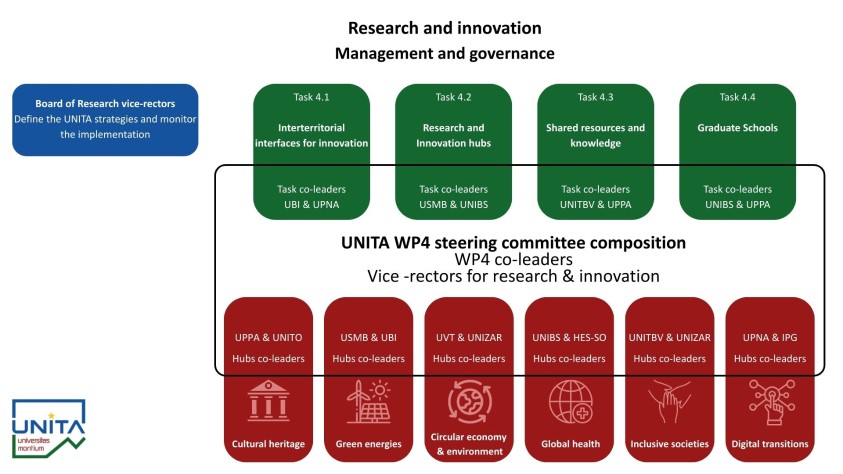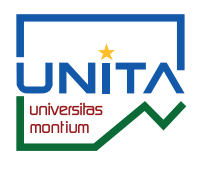European Alliances of Universities are an increasingly important tool in the development of the European Research Area. One of the first priorities of the Re-UNITA project, and of the UNITA Alliance, was to draw up an analysis of our R&I strategies.
At first, the mapping of research policies of each university's research policies (and funding environment) was carried out. Since it contains confidential information, it is not intended to be shared.
However, it did provide an opportunity to compare the different sizes, organizational structures and funding methods of our universities.
11400+ Researchers
3700+ PhD students
An integrated and ambitious governance dedicated to R&I in UNITA
Since 2021, the research and innovation strategies and activities within UNITA Alliance are monitor by the board of Research vice-rectors.
This high-level board, built in trust and mutual knowledge, leads to three main objectives:
- identify common strategies and scientific policy in UNITA Alliance
- ensure proper implementation of UNITA R&I activities in our own institutions
- promote the ambition of UNITA Alliance in Research & Innovation towards public and private actors

Human resources for R&I excellence
In the framework of WP3 of Re-UNITA, UNITA partners intend to design common strategies to valorize the high potential of the Alliance’s human capital, making UNITA one of the most attractive and innovative environments in Europe for researchers. Task 3.1 deals with the promotion and implementation of HRS4R in Re-UNITA universities. The key tool of task 3.1 is a roadmap, designed to guide all the partners in the HRS4R awarding process. This work has therefore a twofold goal: firstly, it aims at deepening our knowledge about the state of the art of the triggering reasons that pushed the Re-UNITA Universities in actively engaging in the HRS4R process, as well as highlighting the process undertaken by the Universities that already obtained the Award. In that sense, it entails both a descriptive and a normative purpose: through a detailed description of the process as undertaken by the best practices that already obtained the award, we intend to provide an in-depth report of the process and, at the same time, a roadmap that will include some practical suggestions and useful resources for the Universities that are engaging in the HRS4R procedure and for those who are likely to undertake this path in a near of far future.
Research policies - White paper on local, regional and international research frameworks
Through the Re-UNITA project, the six partners are seeking to develop a common scientific strategy and scientific collaborations with a high scientific and societal impact, in particular to contribute to the development of our societies and territories in a European dimension.
In order to meet this general objective, all partners must provide financial support for research activities, either through operating expenses, investment in research equipment or financing labor costs (research support staff and researchers’ wages).
The mapping of scientific policies within the Alliance (deliverable D2.2) has shown that partners cannot rely only on the State’s subsidies, where they exist, to fund their research activities. They then have to mobilize other funding opportunities. However, these opportunities vary greatly from one country to another, due to very different political systems for funding research.
The aim of this white paper is to present how the six UNITA partners are mobilizing the available opportunities to fund research. Therefore, it does not present theoretical funding opportunities, but rather those that are currently being activated by partners.
Based on an ad-hoc survey, this white paper highlights the need for a multi-level approach, considering not only national and international research funding opportunities, but also local and regional ones. Although this level was not anticipated at the outset, it has been added to the document and analysed in detail, as, in some countries, local and regional institutions contribute significantly to research funding. In addition, this white paper focuses only on research funding opportunities other than those arising from scientific collaboration with private partners, leading to a research contract and results that may be co-owned. These transfer activities are of course carried out by UNITA's partners but are not analysed in this report.
At the end of this white paper, recommendations are formulated to help Alliance partners share best practices and optimize or even coordinate research funding applications.
Interdisciplinarity & open-innovation
UNITA was initially formed around three common research topics: cultural heritage, renewable energies and circular economy. These three areas have been considered as a priority because of territory considerations: cross-border, rural and mountains territories and roman languages, and also because they are shared by the six partners. This set of thematic is expected to grow as UNITA will expand in the coming years.
Each of these thematic requires an interdisciplinary approach, the only one capable of considering the complexity of the interactions between these actors, the diversity of the economic actors involved (households, firms, local governments, national States and transnational institutions), and the multiple temporality of the issues (short term, medium term and long term).
However, carrying out interdisciplinary research cannot be limited to bringing re-searchers from different disciplines around the table, but requires to address to main challenges.
The first one, associated to academics, is related to the need for the researchers to think about research in a different way. Up to now research activities are restricted within disciplinary borders. Although this approach can appear riskier given the institutional environment, there is a need for sharing ideas and approaches beyond these borders, to stimulate scientific knowledge and address cur-rent global issues that go far beyond sectorial approach.
The second challenge would be to include all stakeholders, including non-academics in an open innovation process, and training researchers in this area, as well as to incite them to develop collaborations outside their usual networks.
